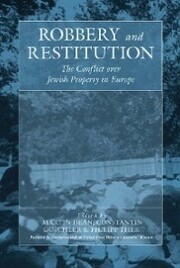Detailansicht
Robbery and Restitution
eBook - The Conflict over Jewish Property in Europe, War and Genocide
ISBN/EAN: 9780857455642
Umbreit-Nr.: 1999069
Sprache:
Englisch
Umfang: 308 S.
Format in cm:
Einband:
Keine Angabe
Erschienen am 01.05.2007
Auflage: 1/2007
E-Book
Format: PDF
DRM: Adobe DRM
- Zusatztext
- <p> The robbery and restitution of Jewish property are two inextricably linked social processes. It is not possible to understand the lawsuits and international agreements on the restoration of Jewish property of the late 1990s without examining what was robbed and by whom. In this volume distinguished historians first outline the mechanisms and scope of the European-wide program of plunder and then assess the effectiveness and historical implications of post-war restitution efforts. Everywhere the solution of legal and material problems was intertwined with changing national myths about the war and conflicting interpretations of justice. Even those countries that pursued extensive restitution programs using rigorous legal means were unable to compensate or fully comprehend the scale of Jewish loss. Especially in Eastern Europe, it was not until the collapse of communism that the concept of restoring some Jewish property rights even became a viable option. Integrating the abundance of new research on the material effects of the Holocaust and its aftermath, this comparative perspective examines the developments in Germany, Poland, Italy, France, Belgium, Hungary and the Czech Republic.</p>
- Kurztext
- The robbery and restitution of Jewish property are two inextricably linked social processes. It is not possible to understand the lawsuits and international agreements on the restoration of Jewish property of the late 1990s without examining what was robbed and by whom. In this volume distinguished historians first outline the mechanisms and scope of the European-wide program of plunder and then assess the effectiveness and historical implications of post-war restitution efforts. Everywhere the solution of legal and material problems was intertwined with changing national myths about the war and conflicting interpretations of justice. Even those countries that pursued extensive restitution programs using rigorous legal means were unable to compensate or fully comprehend the scale of Jewish loss. Especially in Eastern Europe, it was not until the collapse of communism that the concept of restoring some Jewish property rights even became a viable option. Integrating the abundance of new research on the material effects of the Holocaust and its aftermath, this comparative perspective examines the developments in Germany, Poland, Italy, France, Belgium, Hungary and the Czech Republic.
- Autorenportrait
- <p><b>Martin Dean</b>is a Research Scholar at the Center for Advanced Holocaust Studies, United States Holocaust Memorial Museum (USHMM). He is the author of<i>Collaboration in the Holocaust</i>, published in association with the USHMM in 2000, and of several articles on the confiscation of Jewish property. From 1992 to 1997 he worked as Senior Historian for the Metropolitan Police War Crimes Unit.</p>
